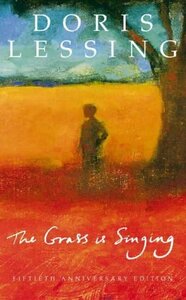Take a photo of a barcode or cover
This was a lot better than I expected it to be. I didn't know what to make of the title (still don't), but I think the whole exploration of the slave trade and the racial divide was exceptional. Mary absolutely infuriated me throughout, but the storyline itself was incredible. 4 stars - a surprising rating for required university reading!
challenging
dark
sad
tense
It's a fairly long and relatively slow read, as well as being rather depressing, yet probably true
Racial politics in 1940s Rhodesia. The Nobel Prize winning author's first novel.
This was my first Doris Lessing book, and I am about to embark on The Golden Notebook. The first half of this book and the middle and end are poles apart, showing the slow demise of a woman's independence, peace of mind and sanity, at the hands of a kind, but hapless man. The descriptions are vivid, further inciting the feeling fear and unease that became such a part of the protagonists life. A greatly enjoyable read for women who need to find their place in life.
Doris Lessing very skillfully recreates the enervation and dissociation experienced by the protagonist Mary Turner such that the reader too undergoes these feelings. The Rhodesian veld rendered dreary because of the experience of the characters, the perpetual tension and subtext of violence make this at once a compelling and yet discomfiting read.
Are you character or plot driving? Or is it all about the narrative and language ? I’m all about the beauty of the language, but the main character in “The Grass Is Singing” by Nobel Prize Laureate Doris Lessing has me all conflicted. I feel for her, her hardship, her determination and how unjust is that she got to be in the position she is (married to a poor farmer, living in the middle of nowhere) when she had it all going for her. Plus, we all know she’ll die terribly. But she is such a horrible person, so racist, so stuck up, that one cannot really fully empathize with her. She is so unlikable. .
On another note, (content warning: strong language), the n-word figures once in this book. It reminded me of Trevor Noah’s Netflix Special “Son of Patricia” where he explains that for black South Africans, the n-word is just another word. It doesn’t have any of the connotations it has in America, the hatred and injustice. But the k-word would make his blood boil. Well, here the k-word is figured constantly. So, all of this makes “The Grass Is Singing” a beautiful yet uncomfortable read. .
On another note, (content warning: strong language), the n-word figures once in this book. It reminded me of Trevor Noah’s Netflix Special “Son of Patricia” where he explains that for black South Africans, the n-word is just another word. It doesn’t have any of the connotations it has in America, the hatred and injustice. But the k-word would make his blood boil. Well, here the k-word is figured constantly. So, all of this makes “The Grass Is Singing” a beautiful yet uncomfortable read. .
Two stars for being painful to read, not for being poor-quality (which it isn't).
I'd previously read one other book by Doris Lessing, [b:The Good Terrorist|707060|The Good Terrorist|Doris Lessing|https://images.gr-assets.com/books/1358325562s/707060.jpg|2769827], and despite being written 35 years apart they share the same writing style. Both are unrelentingly bleak, with miserable and pathetic characters who nonetheless feel extremely believable in their hopelessness. You get the sense that Lessing might not have been the kind of person you'd want to befriend, with an eagerness to identify people's every personal failing and crucify them at length for it. She has a talent for it, of course, and in the case of The Grass is Singing the end result is a sharp criticism of the racist, nasty society of Southern Rhodesia. It's still not pleasant to read.
The central characters of this book are Mary Turner and her husband, Dick. After a miserable rural childhood, Mary spent her young adult years "in town", making good money in an office and filling her free time with parties, sports, social engagements, and so on. However, as she reached her mid-thirties she realised that her “friends” were all mocking her behind her back for her dress sense and lack of romantic entanglements, and so she cast about for a husband, any husband. She happened upon Dick, a poverty-stricken farmer, and after the most dire courtship of all time they married and she moved to his farm.
There, Mary goes stir-crazy in a ramshackle house that offers little protection from the heat and too far away to enable much social interaction with other white people – just their neighbours, the Slatters, who Mary snubs at every opportunity because she's embarrassed by her poverty. Of course, she's also ashamed of her husband, who she sees as a failure, and vicious towards all their African workers, because she's convinced of their inferiority in relation to her and wants to make sure they know it.
This book reminds me a lot of [b:Coonardoo|1961207|Coonardoo|Katharine Susannah Prichard|https://s.gr-assets.com/assets/nophoto/book/50x75-a91bf249278a81aabab721ef782c4a74.png|1964276], which was also written by a white, female socialist from a brutally racist settler-colonial society (in the case of Coonardoo, it takes place on a remote station in outback West Australia). In particular, both books share the same major flaw: despite the fact that they were written as rebukes of racism, the black characters are all so poorly and weakly depicted. They are not given clear motivations and complicated inner lives the way that all the white characters are; they're left as vague ciphers, ready to morph into plot devices whenever the author requires it. I know that these books were written decades ago, and were important works in their time. However, if you were to ask me whether these works are still relevant today, my answer would have to be probably not. There have to be so many better critiques of colonialism and racism, ones that don't fall into racist tropes themselves (and probably ones written by those who actually experience racism, although I do think it's important for the racially privileged to criticise it as well). Like, The Grass is Singing is bookended by a murder which never has its motive explained – apparently we're just supposed to assume Africans do things like that, sometimes, randomly, because they resent their oppression. It's the kind of ridiculous leap of logic that we'd never be expected to make for a white character.
So overall, I dunno. While I can see why Lessing is so heralded as an author, I don't think her work is to my tastes and this book in particular made me uneasy. I also think it's weird that the blurb describes it as set in South Africa when it's not – was the publishing house really that ignorant, or did they assume their customers were? It's true that Ian Smith's illegitimate regime was very similar to South Africa's apartheid government, and critics of one tended to find themselves banned from the other as well (as happened to Lessing herself in 1956). They still weren't actually the same country, though. But regardless… significant as this book may be, it is flawed and not particularly enjoyable, so while you can read it if you want, I wouldn't suggest making it a high priority.
I'd previously read one other book by Doris Lessing, [b:The Good Terrorist|707060|The Good Terrorist|Doris Lessing|https://images.gr-assets.com/books/1358325562s/707060.jpg|2769827], and despite being written 35 years apart they share the same writing style. Both are unrelentingly bleak, with miserable and pathetic characters who nonetheless feel extremely believable in their hopelessness. You get the sense that Lessing might not have been the kind of person you'd want to befriend, with an eagerness to identify people's every personal failing and crucify them at length for it. She has a talent for it, of course, and in the case of The Grass is Singing the end result is a sharp criticism of the racist, nasty society of Southern Rhodesia. It's still not pleasant to read.
The central characters of this book are Mary Turner and her husband, Dick. After a miserable rural childhood, Mary spent her young adult years "in town", making good money in an office and filling her free time with parties, sports, social engagements, and so on. However, as she reached her mid-thirties she realised that her “friends” were all mocking her behind her back for her dress sense and lack of romantic entanglements, and so she cast about for a husband, any husband. She happened upon Dick, a poverty-stricken farmer, and after the most dire courtship of all time they married and she moved to his farm.
There, Mary goes stir-crazy in a ramshackle house that offers little protection from the heat and too far away to enable much social interaction with other white people – just their neighbours, the Slatters, who Mary snubs at every opportunity because she's embarrassed by her poverty. Of course, she's also ashamed of her husband, who she sees as a failure, and vicious towards all their African workers, because she's convinced of their inferiority in relation to her and wants to make sure they know it.
This book reminds me a lot of [b:Coonardoo|1961207|Coonardoo|Katharine Susannah Prichard|https://s.gr-assets.com/assets/nophoto/book/50x75-a91bf249278a81aabab721ef782c4a74.png|1964276], which was also written by a white, female socialist from a brutally racist settler-colonial society (in the case of Coonardoo, it takes place on a remote station in outback West Australia). In particular, both books share the same major flaw: despite the fact that they were written as rebukes of racism, the black characters are all so poorly and weakly depicted. They are not given clear motivations and complicated inner lives the way that all the white characters are; they're left as vague ciphers, ready to morph into plot devices whenever the author requires it. I know that these books were written decades ago, and were important works in their time. However, if you were to ask me whether these works are still relevant today, my answer would have to be probably not. There have to be so many better critiques of colonialism and racism, ones that don't fall into racist tropes themselves (and probably ones written by those who actually experience racism, although I do think it's important for the racially privileged to criticise it as well). Like, The Grass is Singing is bookended by a murder which never has its motive explained – apparently we're just supposed to assume Africans do things like that, sometimes, randomly, because they resent their oppression. It's the kind of ridiculous leap of logic that we'd never be expected to make for a white character.
So overall, I dunno. While I can see why Lessing is so heralded as an author, I don't think her work is to my tastes and this book in particular made me uneasy. I also think it's weird that the blurb describes it as set in South Africa when it's not – was the publishing house really that ignorant, or did they assume their customers were? It's true that Ian Smith's illegitimate regime was very similar to South Africa's apartheid government, and critics of one tended to find themselves banned from the other as well (as happened to Lessing herself in 1956). They still weren't actually the same country, though. But regardless… significant as this book may be, it is flawed and not particularly enjoyable, so while you can read it if you want, I wouldn't suggest making it a high priority.




